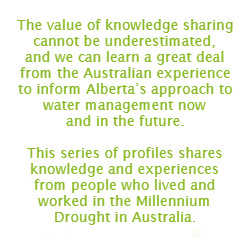Drought in Hindsight – Sharing Lessons from Australia’s Millennium Drought
Welcome to our interview series to share knowledge from different perspectives on drought
Water shortages and scarcity are already issues of global prominence. In places like California, Africa, and India, droughts have had severe environmental, economic, and social impacts.
Projections indicate drought events similar to the western North America dry spell from 2000 to 2004 will be the norm toward the end of this century and climate change is expected to bring longer, drier droughts in the future [1].

In Alberta, with mighty rivers and mountain lakes, we often take our water for granted, believing we have an abundant supply; however, the reality is that drought is common in Alberta and has struck the province many times in the past, resulting in significant economic losses and environmental impacts. For example, Alberta was stricken by a drought in 2015, which lead to a declaration of agricultural disaster [2].
Spin the globe to Australia—and we find a country which is no stranger to water shortages. What many of us Albertans may not know, however, is Australia was stricken with the longest and most severe drought on record at the turn of this century. From 1997 to 2009 the now named Millennium Drought gripped the southeastern region of the country, as well as areas of southwestern Australia and the east coast.
The impact of this drought was devastating to agriculture, the environment, and communities in both rural and urban areas. However, the drought did bring something to those who survived it: knowledge. In the light of disaster, Australians across industries and communities built a wealth of knowledge about what did and didn’t work, and how to better manage water scarcity.
Click on a profile below to read some key insights from Australians on drought and water management.
Government Leader Perspective
“Every decision I made on a daily basis had a profound impact on people in my community, across the State of South Australia, and often the National interest was impacted. In many instances the science was incomplete, but to defer decisions until more evidence could be accumulated was not an option.” The Hon Karlene Maywald | Family in Agriculture Perspective
“We had to decide what was viable on the property, that is, what was worth keeping. Oranges were worth almost nothing so we ripped out three acres of those and changed all our irrigation methods.Over the years a lot of trees had to be removed because of the stress the drought had put on them.”
Liza Kalogerias | Water Industry Leader Perspective “We’ve been lucky to have cheap water, I think is it still cheap even today; the top price is $3.50 per kilolitre delivered to your house, if you do the same for firewood you pay $350. That’s been part of our problem; water is cheap so people don’t value it—and that’s a bigger issue, understanding and valuing water.” Neil Palmer |
Water Security Planner Perspective “It’s hard to get people more excited about it, but I’d be more persuasive about the value of good quality data. Good quality data is critical to ensure water security decisions can incorporate the need to design around risks, variability, uncertainty, quality, and timing.”
Steve Kotz |
Water Quality Expert Perspective “It’s important professionals in the water sector, who have extensive experience and knowledge on water, should be prepared to speak out publicly when they see things going wrong.”
Professor Don Bursill AM |
Water Education Perspective “All of the programs had different benefits and they were also specifically designed for certain age groups. The humorous stage shows were definitely the most entertaining, but in-depth science investigations were also of great value to our senior chemistry students.” Lyn Jeffries |
Sources:
1. Scientists warn it’s the ‘new norm’ after worst drought in 800 years, Renata D’Aliesio, The Globe and Mail. July 29, 2012 http://www.theglobeandmail.com/news/national/scientists-warn-its-the-new-norm-after-worst-drought-in-800-years/article4448166
2. Alberta declares disaster after losses from drought, Erika Tucker, Global News, August 21, 2015. http://globalnews.ca/news/2179582/alberta-declares-disaster-after-losses-from-drought
